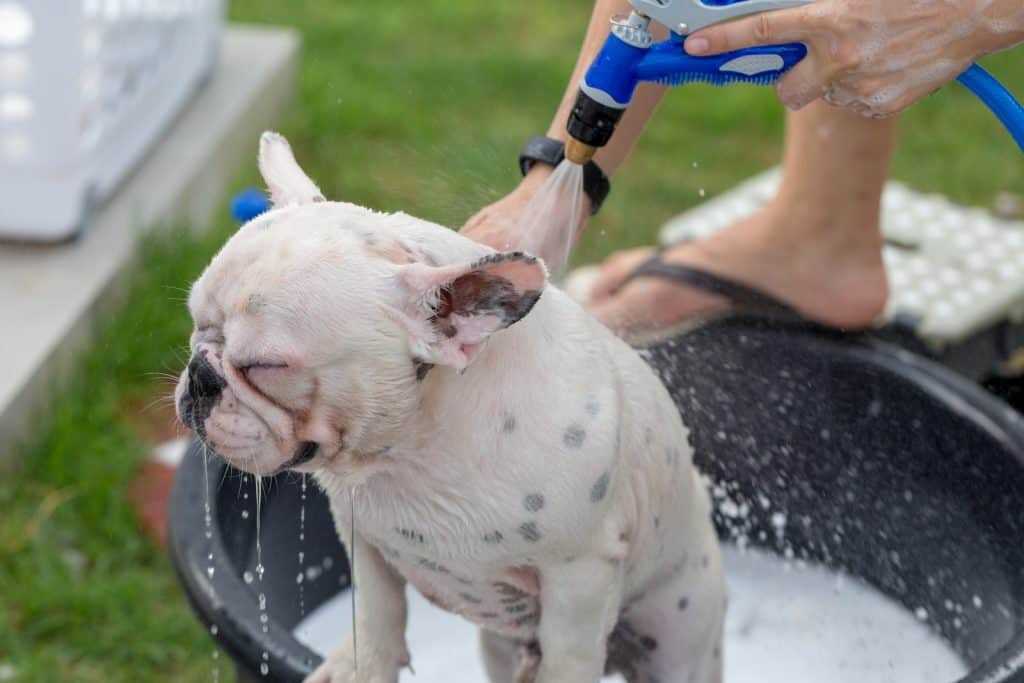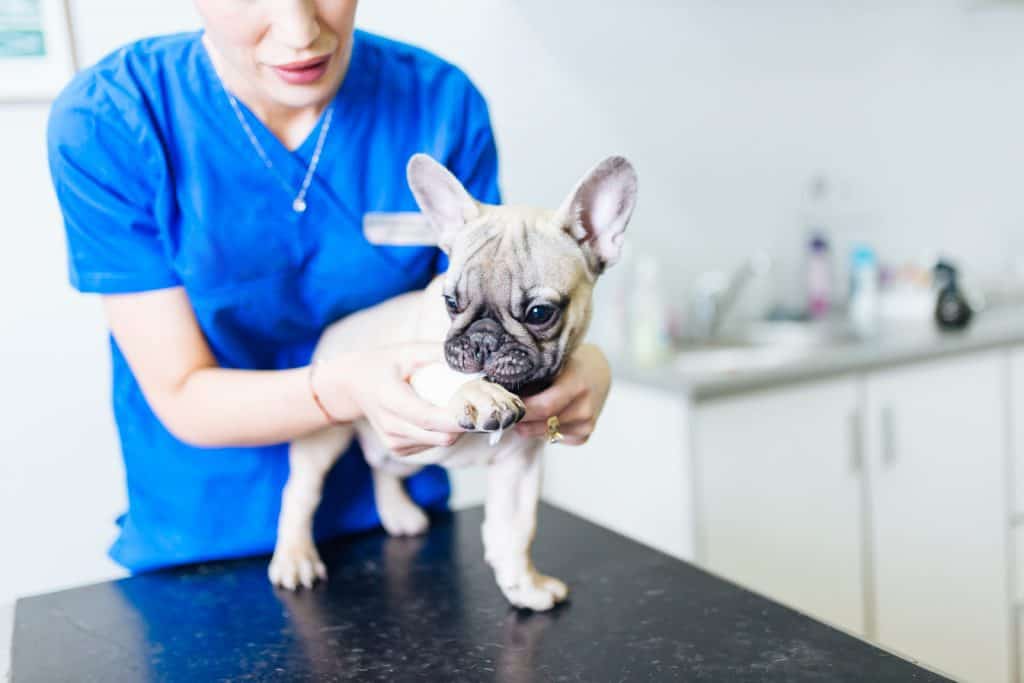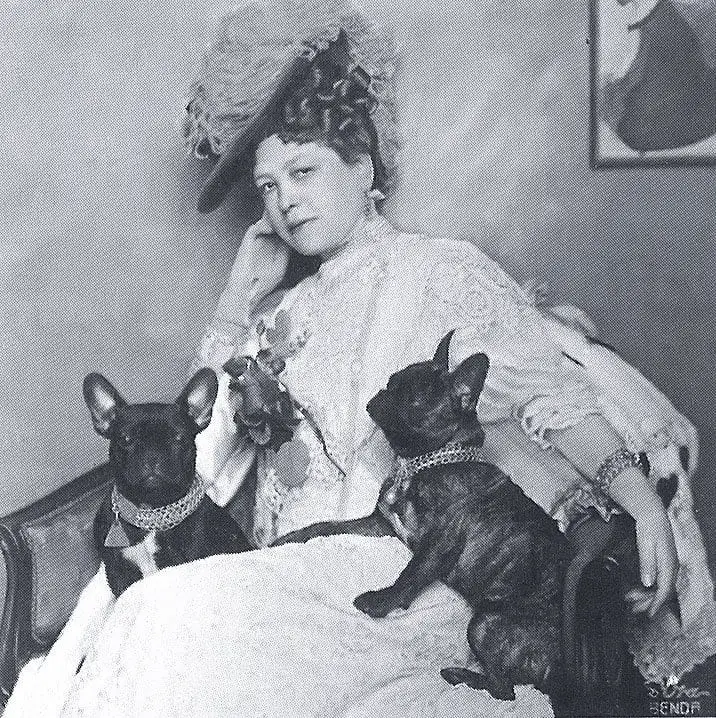French Bulldogs are easily one of the most recognizable breeds and have soared in popularity in recent years.
In fact, they were the 6th most popular breed in the USA in 2015.
While the breed has its origins as a rat hunter, they’ve been kept as companion pets for hundreds of years.
Other Names: Frenchie, Bouledogue Francais
Country Of Origin: France
Dog Group: Non-sporting
Size: Small
Recommended For: Families, couples, single owners
Maintenance Level: Moderate
Lifespan: 11-13 years
Temperament: Playful, loving, friendly
French Bulldog Commonly Asked Questions
Good For the First-Time Owner: Yes
Good With Children: Yes
Good With Other Animals: Yes
Good With Strangers: Yes
Good For Apartments: Yes
Exercise Requirements: Daily walking
Can Live In Hot Weather: Sometimes
Can Live In Cold Weather: Yes
Can Tolerate Being Left Alone: Yes
Grooming: Moderate
Trainability: Moderate
Breed Overview:

French Bulldogs make excellent pets for families and are affectionate towards children.
However, owners should be aware of the breed’s common health complications, mainly related to their short noses, as these can become very expensive to deal with.
Colors: Black, brindle, fawn, pied, sometimes with a black mask
Height: 11-12 inches (both males and females)
Weight: Males: 20-28lbs, Females: 16-28lbs (dogs weighing under 30 pounds )
Personality and Temperament:

French Bulldogs are known for their friendly and loving temperament. They thrive on human attention and are very friendly dogs.
Frenchies generally love nothing more than sleeping next to their owner, which makes them an excellent choice as a companion pet for all ages.
Similarly, French Bulldogs are a great choice as a family pet because they love playing with children.
However, owners should be careful about keeping a Frenchie around smaller children.
They can be rough without meaning to be, and French Bulldogs are prone to several serious, but easily caused injuries.
French Bulldogs often develop a cheeky and playful personality and are frequently known for clowning around.
However, owners will get the most from their Frenchie if they train them properly, as this will allow owners to control this behavior when it gets too much.
Some Frenchies, particularly young ones, love to wind their owners up with their behavior, and it’s important to manage this properly.
When it comes to exercise, French Bulldogs can take a lot more than you’d think. They can be very energetic once they get outside, and will appreciate daily walks between 30 minutes and an hour.
Owners should know that Frenchies have problems regulating their temperature and can overheat quickly, so be careful with the amount of exercise they get during summer months.
Check it Out: French Bulldog Pros and Cons
French Bulldogs are generally fine around strangers, although they might bark while at home if they feel threatened.
Owners seem to be divided on how much Frenchies bark, as some say not a lot, and others say loads.
Much will depend on the dog, but either way, they can make pretty good alert dogs. Just don’t expect them to do anything more than bark.
Frenchies are very sociable animals and will usually love being around other dogs. They’re an ideal breed for keeping in numbers, as most French Bulldogs will prefer being kept with other dogs.
Frenchies will also be fine around other pets. Owners should be cautious around small animals like mice, as the breed does still retain some prey instinct.
One of the best things about French Bulldogs is that they can be kept in almost any household.
While they will appreciate having land, Frenchies are also suitable for keeping in an apartment.
If you decide to do this, make sure you give the dog more exercise because obesity is a particular problem for French Bulldogs.
It’s vital for potential French Bulldog owners to know the best temperatures for keeping the dog happy.
While Frenchies can live in warmer climates, they begin to have difficulty when the temperature exceeds 75 degrees.
Once this happens, they become more prone to heatstroke, which can be fatal. French Bulldogs will be much happier kept in colder climates. If you do decide to keep one somewhere warm, just be sensible about when you exercise the dog.
Although French Bulldogs are very sociable animals, they can be left alone for more extended periods.
However, establishing a proper routine is essential because the breed can be prone to separation anxiety.
Leaving a Frenchie with other dogs is an easy way to avoid this because they’re generally happy with any company.
French Bulldogs can make the right choice for first-time owners because they’re pretty easy to train and their size makes them much easier to manage.
However, inexperienced owners should educate themselves on the breed’s health issues, as these can become very expensive to manage later in the dog’s life.
French Bulldogs are much more of a commitment than people think, so it’s worth thinking correctly about this responsibility.
Grooming:

French Bulldogs have a short, sleek coat that sheds consistently throughout the year. Weekly brushing with a rubber mitt or razor comb is the easiest way to keep it under control, but bathing should be kept to a minimum to avoid skin irritation.
Owners need to be very careful with a French Bulldog’s eyes, and they need to be checked regularly for signs of damage and debris.
Similarly, their face wrinkles should be cleaned once a week with a Q-tip to avoid infections.
Trimming a Frenchie’s nails in important, especially if the dog is living in an apartment.
Regular exercise should keep them short enough, but be sure to check every week or so, as long nails can be very painful for the dog.
Brushing the dog’s teeth several times a week avoids the worst dental problems, but Frenchies are prone to losing teeth later in their lives.
Common Diseases and Conditions:

The biggest health problems for French Bulldogs are related to them being brachycephalic.
This refers to their short nose and results in breathing difficulty and poor temperature regulation.
Owners should be careful when they exercise the dog and educate themselves on the symptoms of heatstroke.
Another big issue for Frenchies is their eyes. They can develop juvenile cataracts,[1] and are prone to corneal ulcers.
These can be caused by almost nothing, such as a small piece of grass, and can result in the dog going blind. If you decide to get a Frenchie, make sure you know what corneal ulcers look like, and visit your vet immediately if you have any concerns.
While it’s not necessarily a health condition, owners should be aware that French Bulldogs can’t swim.
This is because they’re front-heavy and have short legs. Frenchies should never be left unattended around open water because they will drown. It isn’t just a case of they don’t know how; Frenchies physically cannot swim.
A responsible French Bulldog breeder will test for hereditary conditions like skin problems and hip dysplasia, but the most serious conditions for the breed are related to its appearance.
For this reason, they’re essentially unavoidable, and owners should understand the responsibility and potential costs associated and should avoid buying a Frenchie as a fashion statement.
History:

This is because the Frenchie comes from the Old English Bulldog, which was bred into a Toy Bulldog in the 19th century.
This was exactly what it sounds like” a miniature version of the Bulldog, and was bred as a companion animal.
The Toy Bulldog was created by crossing the Bulldog with Terriers, which were considered common dogs.
Toy Bulldogs were popular in England during the mid-19th century, and over time found their way across the Channel to France.
Over time, Toy Bulldogs were traded or imported to France from England, and they became more popular there than in their home country. By 1860, there were almost no Toy Bulldogs left in England.
The breed’s name eventually naturally changed to French Bulldog as it became recognized as a specific breed.
They’ve remained popular as a companion pet ever since, and are also very popular in dog shows and the media.
French Bulldogs are generally very expensive dogs, which is mainly to cover the costs of healthcare, but they’re definitely worth every penny.
DID YOU KNOW?
- French Bulldogs are known to sulk if they get shouted at. This ability to understand human emotion is a testament to their role as a companion pet.
- French Bulldogs can either have rose-shaped ears or bat ears. Rose shape is more common in Europe, but American breeders prefer bat ears.
- French Bulldogs have great difficulty reproducing because of their shape. Most are born through artificial insemination, and most pregnant Frenchies have to undergo C-sections. This is because the puppies have such large heads.
- For this reason, pregnancy is one of the highest causes of mortality in the breed.
- Celebrities love French Bulldogs. Famous owners include Lady Gaga, The Rock, Leonardo DiCaprio, and Hugh Jackman.
- Frenchies are a very intelligent breed and need plenty of mental stimulation to keep them happy.
French Bulldog Pros and Cons Video
More French Dog Breeds Soon!
REFERENCES:
1.[^] FrenchBulldogHealthPanel, www.vgl.ucdavis.edu/services/dog/FrenchBulldogHealthPanel.php.

